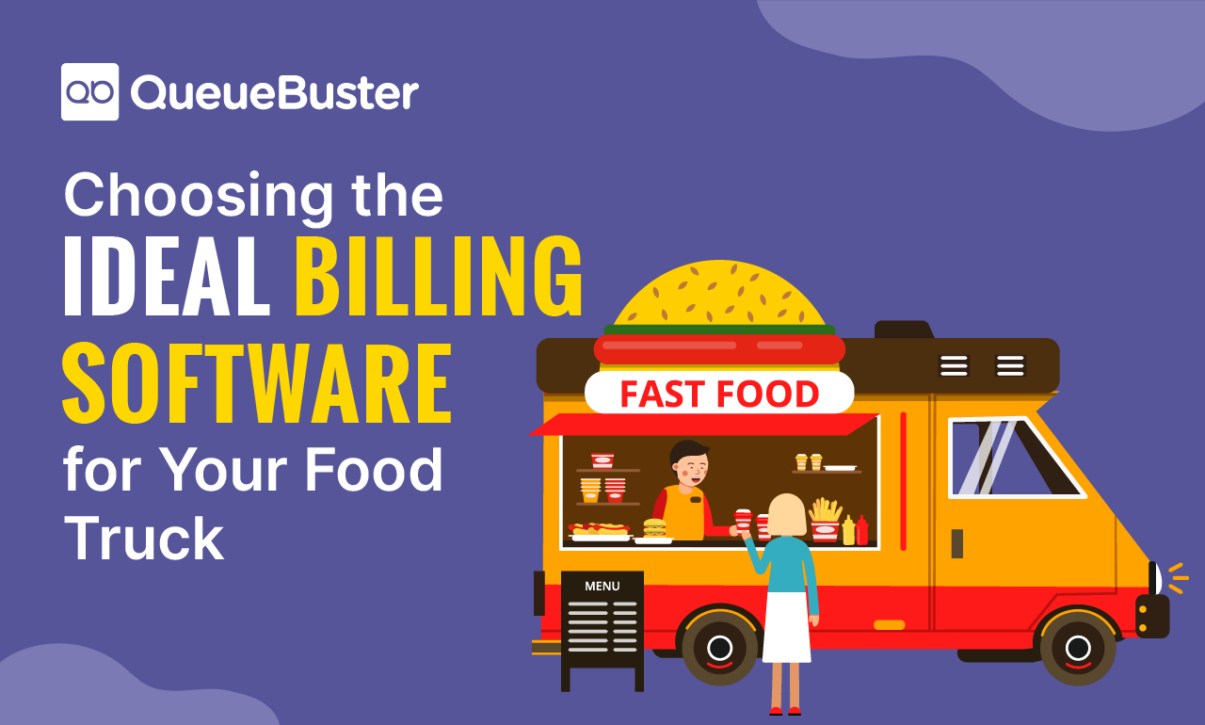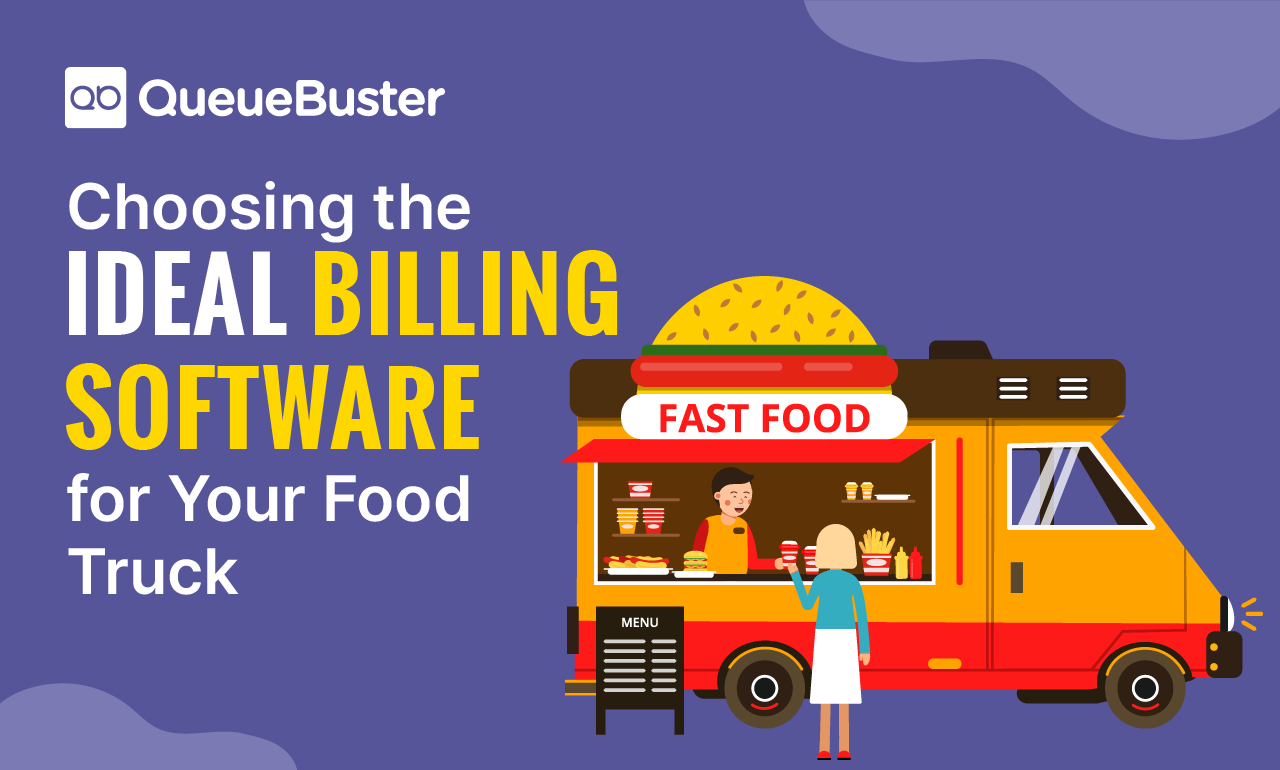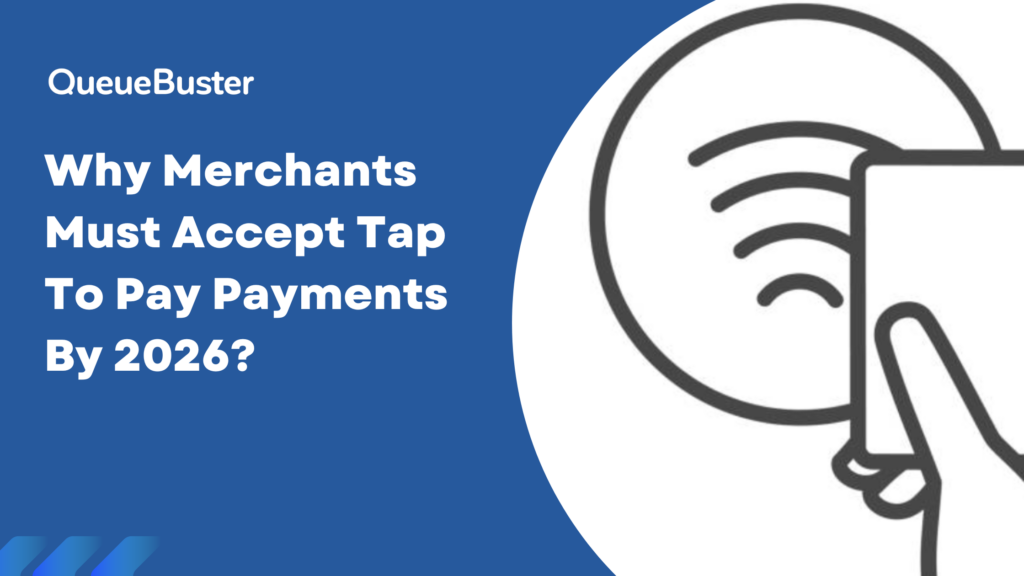
How To Choose The Best Food Truck Billing Software For Your Business?
How To Choose The Best Food Truck Billing Software For Your Business?

By QueueBuster Team Published: July 13th, 2024
The food truck business has been gaining popularity in recent years, offering a unique dining experience that appeals to customers who crave fresh and flavorful food. As a food truck owner, you know that running a successful food truck business requires more than just serving delicious food.
You need to have efficient operations, streamlined processes, and an excellent customer experience. One of the most critical decisions you will make is choosing the best POS system for food trucks.
In this blog, we’ll guide you through the essential factors to consider when choosing a POS system for your food truck business. We’ll cover key aspects like mobility and flexibility, user-friendly interface, payment processing, inventory management, reporting and analytics, customer management, and customer support. By the end of this blog, you’ll have a clear understanding of what to look for in a POS system and how it can help you improve your business operations and increase profits.
Mobility and Flexibility:
As a food truck owner, your business is all about mobility. Therefore, your POS system should be able to move with you wherever you go. A cloud-based POS system that works on both iOS and Android devices is a perfect solution as it allows you to take orders, manage inventory, and view reports on the go.
Error: Contact form not found.
You won’t have to worry about losing sales or waiting until you get back to the truck to enter orders into the system. A mobile POS system also enables you to serve customers quickly and efficiently, reducing wait times and enhancing the customer experience.
User-Friendly Interface:
A fast-paced food truck environment requires a food trucks POS system with an easy-to-use interface. A complicated system can slow down your workflow, leading to long lines and impatient customers. A user-friendly POS system allows you to navigate through the system quickly and efficiently. It should also be intuitive, allowing your staff to learn and operate it without extensive training.
Payment Processing:
A POS system should be able to process all types of payments to ensure that you never miss out on a sale. Cash, credit/debit cards, and mobile payments like Apple Pay and Google Wallet should be supported. Accepting a wide range of payment options enhances the customer experience and can increase sales.
A reliable payment processing system should also be secure, ensuring that customer payment data is protected.
Inventory Management:
Managing inventory can be a challenge for food truck owners, especially with limited space. An effective POS system should allow you to manage your inventory efficiently. The system should enable you to track ingredients, monitor stock levels, and alert you when stocks are running low.
With accurate inventory management, you can reduce waste and ensure that you always have the right ingredients on hand.
Reporting and Analytics:
Detailed reports and analytics allow you to identify areas for improvement, track sales trends, and forecast future sales. Look for a POS system that offers real-time reporting and analytics, enabling you to make informed decisions on the fly. You can quickly access data that shows which menu items are popular, which days are the busiest, and which promotions are the most successful.
These insights can help you make informed decisions to optimise your business operations and increase profits.
Customer Management:
Managing customer data is crucial for building a loyal customer base. A food trucks POS that enables you to manage customer data, such as contact information, order history, and preferences, can help you personalize the customer experience. By understanding your customers’ preferences, you can offer promotions and menu items that resonate with them. You can also offer personalized recommendations and promotions to keep them coming back.
Customer Support:
Finally, when choosing a POS system, you should consider customer support. Look for a provider that offers 24/7 customer support and can assist you with any issues or questions that may arise. Your POS system is critical to the success of your food truck business, and any downtime can lead to lost sales and a negative customer experience.
A reliable customer support team can help you resolve issues quickly, minimizing downtime, and ensuring that your business operates smoothly.
Menu Management:
A good POS system should enable you to manage your menu with ease. It should allow you to create and edit menu items, prices, and descriptions, and add modifiers or special instructions.
A menu management feature can help you quickly update your menu and ensure that customers receive accurate pricing and descriptions.
Integration with Other Applications:
Your food trucks POS software should integrate seamlessly with other applications and services that you use. For example, if you use accounting software or an online ordering platform, ensure that your POS system can integrate with them.
Integration can help you streamline your business operations and minimize manual data entry.
Scalability:
Your food truck business may grow over time, and your POS system should be able to grow with you. Look for a POS system that is scalable and can handle an increasing number of transactions, menu items, and customers.
Scalability ensures that your POS system can handle your business growth without the need for a costly upgrade.
Customisation:
Every food truck business is unique, and your POS system should be customisable to your needs. Look for a POS system that allows you to customise your menus, receipt templates, and order workflows to match your business needs.
Customisation can help you tailor your operations to your customers’ preferences, improve efficiency, and enhance the customer experience.
Offline Capability:
In some cases, you may not have access to the internet or a stable connection. Ensure that your POS system has an offline capability that enables you to continue to process orders, and payments, and manage inventory.
An offline capability ensures that your business can continue to operate even in areas with weak or no internet connectivity.
Ease of Installation and Upgrades:
Your POS system should be easy to install, set up, and update. Look for a system that offers easy-to-follow instructions and minimal hardware requirements. Ensure that software updates are available regularly, and upgrades are easy to perform without requiring extensive technical knowledge.
An easy-to-use POS system ensures that you can spend more time focusing on your business and serving customers.
Choosing the best food trucks POS solution for your food truck business is a crucial decision that can impact your operations, efficiency, and ultimately, your profitability. By considering the factors we’ve discussed in this blog, including mobility and flexibility, user-friendly interface, payment processing, inventory management, reporting and analytics, customer management, customer support, menu management, integration with other applications, scalability, customisation, offline capability, and cost, you can make an informed decision that meets your specific needs and preferences.
Error: Contact form not found.
QueueBuster is a cloud-based POS app that offers all the features and functionality you need to manage your food truck business successfully. With QueueBuster, you can streamline your operations, improve efficiency, and focus on providing your customers with delicious food and excellent service.
If you’re interested in learning more about QueueBuster and how it can benefit your food truck business, request a demo, download the QueueBuster POS app, or schedule a demo today at https://www.QueueBuster.co/. By selecting the right POS system, you can take your food truck business to the next level and achieve the success you deserve.
Popular Posts

MEWA India 2026: Showcasing QueueBuster POS to the Global Dry Fruits Industry
MEWA India 2026 was not just another industry event for us, it […]

Why Merchants Must Accept Tap to Pay Payments by 2026
The way customers pay has changed rapidly over the last few years […]